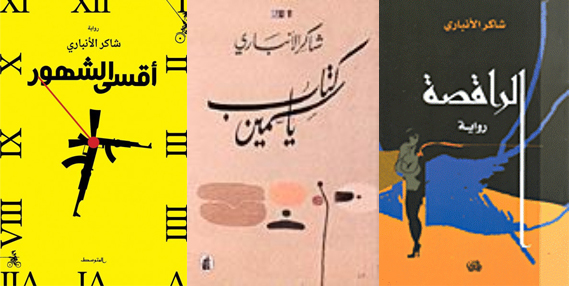Three novels by Shaker al-Anbari. From left to right, “The Hardest Month,” “The Book of the Jasmine,” and “The Dancer."
In his “The Arabic Novel: The Voice of an Oppressed People,” Shaker al-Anbari examines the rise of the Arabic novel as a medium for exploring interactions within Arab communities. Where the short story and poetry failed to capture the large-scale impact of war and strife, the Arabic novel allows writers to artistically respond to the upheaval and change which has shaken entire societies. This has sparked a recent spike in Arabic novels – in numbers and in the desire to translate these works – as publishing houses see a profitable prospect.
Anbari claims that the Arabic novel serves as the voice of oppressed peoples, becoming the mouthpiece through which they express their desires and needs. Unlike short stories, poetry, or other writing means, novels capture the diverse visions of the oppressed, who are existentially separated from the forces that dominate their daily fates. Not only this, but they bear the power to affect actions, policies, and the achievement of goals.
However, Anbari acknowledges the flaws of the Arabic novel and how it has often fallen short of the mark when compared to foreign counterparts in the literary world. To experienced readers, the Arabic novel feels underdeveloped and struggles with structural shortcomings, primarily due to its still incipient stage of modernity. In spite of this, the novel succeeds in telling stories of wars, sectarianism, and human suffering in the wake of the Syrian revolution, Lebanon’s civil wars, and war and revolutionary changes in Iraq and Egypt. These novels have presented the Arab reader with experiences “both horrible and true, open to the styles of the world novel, both Eastern and Western,” as Anbari states. He continues to discuss reasons why literary awards are incapable of setting the course for the future of the Arabic novel, suggesting that such prizes are not the panacea for the state of the novel as long as nepotism and ideological loyalties play a role in determining the winners.
Excerpted from Shaker al-Anbari's “The Arabic Novel: The Voice of an Oppressed People,” which appeared in Al Jadid Magazine, Vol. 23, No. 76, 2019.
Copyright © 2019 AL JADID MAGAZINE

